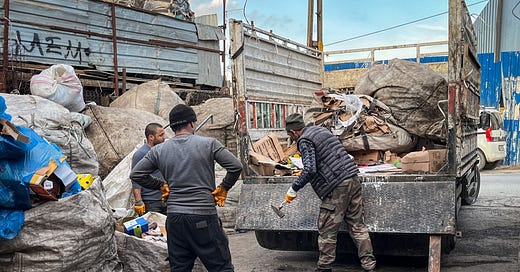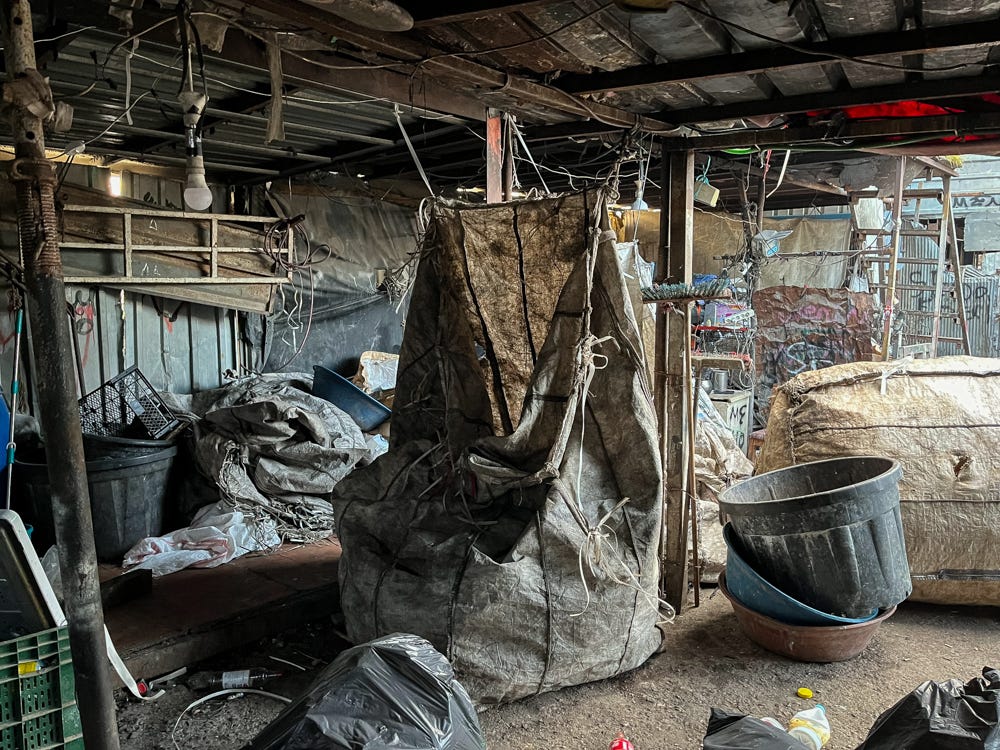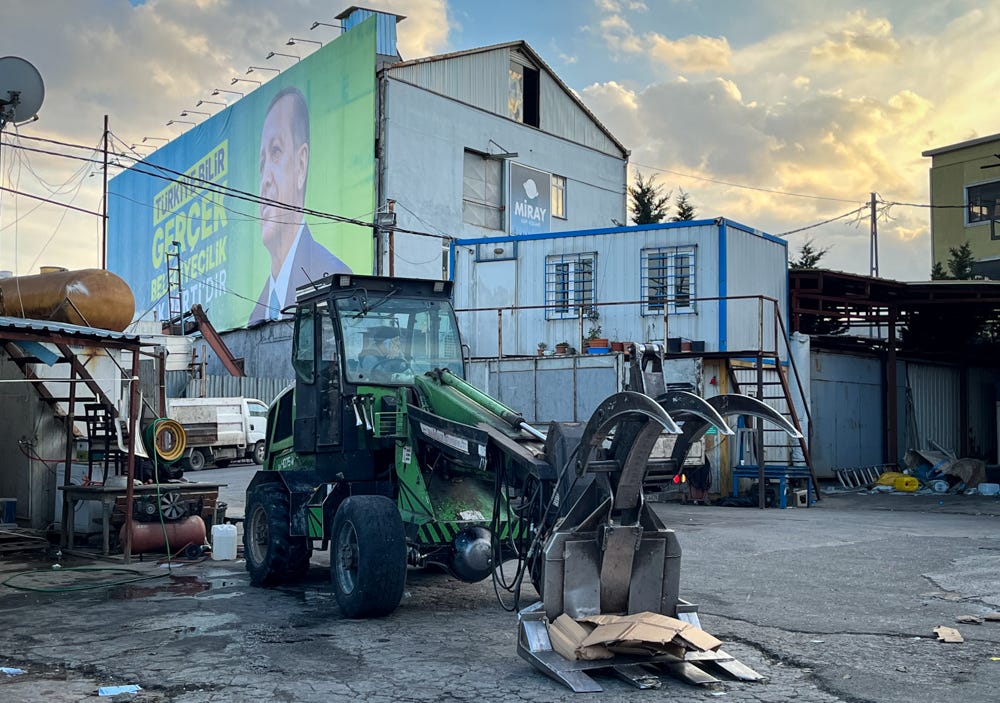Trash money: Turkey is formalizing its waste sector. Informal collectors want to be included.
İSTANBUL – For decades, İstanbul’s waste bins have been managed by informal networks of waste collectors. The groups assign workers to keep watch on individual bins or to circle neighborhoods – hand cart in tow – all to sort and sell discarded materials for income.
This system involved an estimated 500,000 waste collectors nationwide and accounted for about 80 percent of the country’s recycling in 2022. That year, the Turkish government also launched an initiative to regulate this work, though with limited success due to its strict requirements.
At the same time, the state pursued an ongoing effort to formalize Turkey’s waste and recycling sectors – and the revenue they create – under the Zero Waste program, known as Sıfır Atık in Turkish.
In some places, this has meant new waste bins were installed beneath the ground to keep sifters out. In others, ‘Zero Waste’ brand containers were distributed to serve as recycling bins, which today are often misused and filled with unsorted trash.
Still, government data suggests Zero Waste has increased recycling rates in recent years. Taking stock of the changes, informal waste collectors know they can’t stop the state’s encroachment on their business, but they have been quick to highlight the program’s shortcomings while calling on the state to formalize their jobs, as well.
“Zero waste is nothing more than the state turning the stream of water onto itself,” said Ramazan Ağıl, a waste collector and warehouse owner in Fatih’s Vefa district.
Officials from the Zero Waste program and the Ministry of Environment, Urbanization, and Climate Change did not respond to requests for comment for this report.
More recycling
Introduced in the 2017 by First Lady Emine Erdoğan, and championed by then-Environment Minister, current-İstanbul Mayoral Candidate Murat Kurum, Zero Waste is a central pillar of the Turkish government’s environmental policies.
The program involves a variety of initiatives aimed at reducing waste and increasing economic gains in waste management process. It has also introduced waste management guidelines for Turkey, which in 2020 was ranked the lowest among OECD in terms of its overall waste recovery rate.
For Turkey’s public, Zero Waste is likely best known for introducing a small fee on single-use plastic bags in 2019, which has since reduced plastic bag waste.
Such initiatives have made positive impacts on waste management in Turkey and have been lauded by international bodies, like the United Nations Development Programme (UNDP), which has also partnered with Turkish institutions to advance projects in specific regions.
According to a statement shared by the UNDP office in Turkey, Zero Waste had generated about 3.5 billion USD for the Turkish economy at the start of 2023, while safeguarding the environment by protecting trees, and reducing water pollution and greenhouse gas emissions.
Funding opportunities
For Adem, a waste depot owner in Fatih’s Vefa district, Zero Waste has had mixed results, mostly to the detriment of existing waste collectors that he says have been excluded from the program initiatives.
“Our business suffered great losses with the Zero Waste project,” Adem told Turkey recap.
Along with other workers in the sector, he complained Zero Waste increased regulations and fines on informal recyclers and did so before licensed firms amassed sufficient vehicles and employees to manage Turkey’s waste.
Due to lack of staff and know-how in private waste companies, many informal collectors told Turkey recap some recyclable materials currently go unsorted and get dumped in landfills as trash.
“There is a [waste] management strategy in Turkey, and part of it is Zero Waste,” said Ali Mendillioğlu, president of Turkey’s Recycling Workers Association. “But it is not about the environment.”
He continued, saying Zero Waste has “disturbed” the waste industry.
“The only ones not disturbed by this [program] are the powers that receive the EU loans,” Mendillioğlu added, suggesting green initiatives like Zero Waste were useful means to secure foreign funding.
Less sorting
Ayşe Sevgi Sezer, a business owner and chemical engineer who writes regularly on the recycling industry, said the sector has a significant economic potential in Turkey and can also create much-needed job opportunities.
But she said the Zero Waste program, in its current form, has “undermined the recycling process and added new burdens to unemployment,” by reducing the number of jobs in the sector.
“Our leaders discovered that there is a lot of money in recycling,” Sezer told Turkey recap. “Municipalities, especially AKP municipalities, started to give paper tenders to people they knew.”
She added, “When monopolization occurs, prices decrease, exploitation increases, waste collectors cannot access the waste, and those who do are forced to work in worse economic conditions than before.”
Another factor driving down profits for waste collectors is the large amounts of mostly European waste imported to Turkey – a topic that has made international headlines in recent years.
While private companies profited from handling this waste, and sometimes disposed of it in ways that were hazardous to people and the environment, there is a less reported aspect to the imported waste business.
Emrah Bilge, general manager of the Take Care of Your Waste Foundation, said Turkey does not collect enough recyclable material domestically to feed the recycling facilities coming online under the Zero Waste program. For this reason, he said “Turkey is obliged to import garbage.”
“Facilities operating with certain investments have capacities and they need to operate at those capacities,” Bilge told Turkey recap. “In Turkey, not enough waste can be collected for these facilities to operate at their capacities.”
Bilge said the problem is not the amount of waste Turkey produces but the lack of on-site separation – meaning trash and recyclable materials are not adequately sorted at the point of origin, whether it be households, offices or waste bins in the streets.
“The Ministry is working, hundreds of thousands of people are being trained, public service announcements are being broadcast, but we are at a level of thirteen percent in on-site separation, which is not a desired level,” Bilge said.
Job opportunities
As the Environment Ministry continues public awareness campaigns designed to boost recycling rates, informal waste collectors continue to focus on their role and possible employment in Turkey’s waste management transition.
For years, waste collection has been a source of employment for many workers, particularly from areas with low job prospects in southeast Turkey, and more recently for migrant workers.
Citing existing inefficiencies in waste separation, Mustafa Ay, a waste depot owner in Ümraniye’s Dudullu district, said more informal waste collectors should be employed in formal positions considering they already know the job and the various types of plastics.
“Municipalities cannot do this job. It’s not possible without us,” Ay told Turkey recap, saying it requires a specific skill set. “We have been in this business since our childhood.”
After initial Zero Waste regulations were introduced, Ay said authorities raided warehouses and tried to stop his work, but in more recent months, city officials have increasingly sought to work with informal waste collectors.
He said he was in ongoing discussions with İstanbul’s Ümraniye Municipality and hopes to work with administrators soon.
“They took the job from us and after that they couldn't do it,” Ay said. “Our waste workers work meticulously until the evening, like bees, so that no waste is left behind.”
Taking a broader view, he said waste collectors most often come to İstanbul because they can’t find sufficient work elsewhere. He went on to say, if the waste sector is getting formalized, then the conditions for its employees should be formalized as well to include retirement and other standard job benefits.
“Out of one thousand people, we do not have one retired person in our hometown [Siverek],” Ay said. “There are no retirees in our family, there is no decent income, there is agriculture and animal husbandry, but that is also dead. That's why we need to work out how we can all work together.”
This newsletter is supported by readers via Substack and Patreon. Paid subscribers get full access to our recaps, reports, members-only Slack and more. We also have pun-tastic merch. All proceeds go towards sustaining our journalism.
Turkey recap is an independent news platform produced by the Kolektif Medya Derneği, an İstanbul-based non-profit association founded by our editorial team to support and elevate news media and journalists in Turkey.
Get in touch: send pitches, queries and feedback to info@turkeyrecap.com.
Diego Cupolo, Editor-in-chief @diegocupolo
Gonca Tokyol, Editor-at-large @goncatokyol
Ingrid Woudwijk, Managing editor @deingrid
Verda Uyar, Digital growth manager @verdauyar
Sema Beşevli, Editorial intern @ssemab_
Onur Hasip, Editorial intern @onurhasip
This article is part of a series of environmental reports produced with support from the Heinrich Böll Stiftung Turkey Office, and in no way can be interpreted to reflect the views of the Heinrich Böll Stiftung.













This explains a lot of why there have been so many changes in my neighborhood. Thank you for this information.